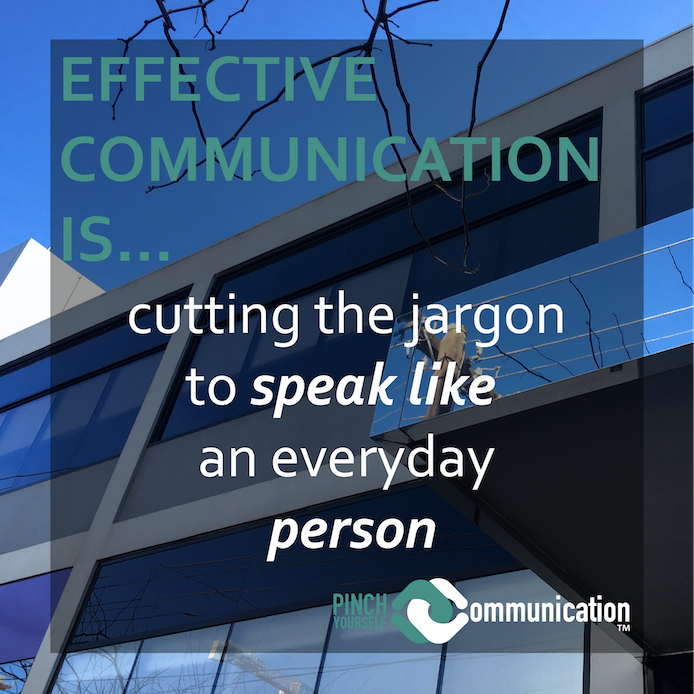Part of the Effective Communication series from Pinch Yourself Communication
It’s a widely-accepted rule of communication that when you speak in jargon, you may exclude or isolate people, fail to be understood or come across in a way that’s disengaging.
But are there any occasions when a bit of jargon doesn’t hurt, or in fact, where it could actually help make communication more effective?
What is jargon and why does it have such a bad name?
Jargon includes technical words which belong to a particular group or industry and acronyms and other shorthand terms which arise within groups for ease and speed of communication.
Then there’s corporate speak, which seems to drain all meaning and colour from regular words, rendering them jargon. [See: Death Sentence, Weasel Words and other works by Don Watson]
A separate but relevant category in the context of this discussion is slang, which is informal language used by a specific social group, and colloquial language, which is the contractions and way of using particular words and phrases that are particular to local speakers of a language.
The problem is that these types of language can be disengaging, isolating and difficult for the audience to understand, or even downright annoying. A recent survey by Sprout Social found 74 per cent of Baby Boomers and Generation X customers found it annoying when brands used slang on social media. However, it seems that Millennials are more forgiving, as 41 per cent of this age group found it ‘cool’ for brands to use slang and 59 per cent found it annoying.
What’s common knowledge to one group of people may be complex and impenetrable to another based on a range of factors including their subject matter expertise, age, first language, culture and so forth.
If the language you use is hiding your true meaning and confusing the audience, your message will be pointlessly lost.
That’s why jargon is considered the enemy of effective communication and speaking like a real human being, using everyday language, is considered to be more effective and engaging.

Why authentic communication is like learning to downhill ski
But are there situations where using jargon can help?
Just as there are exceptions to be made to some other rules of communication, is there a case to be made for dropping the blanket ban on jargon?
Here are a few situations where jargon may prove useful:
• Speaking to a technical audience: If you are speaking to a room full of experts on a topic, using relevant jargon can acceptable. Using jargon around these audiences can be a way to get your point across in a timely and understandable way.
For example, if you’re speaking about EBIT, EPS, NPV and impaired assets to a room full of banking analysts – it’s probably fair to assume it’s their job to understand. The same language used in messages to the bank’s retail customers is not going to work. So if your content is being shared with a wider audience it’s best to minimise, or at least explain the jargon.
• Cross-cultural communication: There can be challenges in ensuring meaning is accurately conveyed when you’re communicating across cultures and languages. For example, if you’re communicating in English with clients, staff or stakeholders who have English as a second language, using some acronyms may actually help simplify language and make things easier to understand. [See: ‘Kill the jargon? No! Non! Nyet!’ by Mike Klein]
• Building credibility: If used correctly, jargon can identify you as an insider when you use relevant terms or acronyms. Others in a group or sector may recognise that you have a deep understanding of the topic you are discussing, making your message more credible and trustworthy. Given the survey findings on slang mentioned above, you may also be able to experiment with using slang to connect with a millennial audience. It’s important to think carefully about your audience before turning to jargon and slang though, as this can backfire and kill credibility.

How to decide whether or not it’s ok to use jargon?
If you’re going to use jargon it should be a deliberate and well-thought decision, not something done by accident or oversight. There are things to consider in weighing this up.
For example:
Who is your audience? Is the language you’re using appropriate to the people you’re addressing?
What do you define as jargon? What is technical language to a group of specialists, is jargon to another. This comes back to understanding your audience.
Is it the right moment in time? Is the language you’re using keeping up with current accepted use. Yesterday’s hot buzzword may feel like today’s jargon to your audience.
Why are you communicating? What do you want your audience to think and feel? Think about your audience and what language is going to best help you achieve your objectives? Even with a technical audience, dialling down the jargon and data, and using some authentic storytelling may have more impact.
As a general rule, it is best to avoid jargon and speak like an everyday person.
So why challenge the notion that all jargon is bad? To make an important point about effective communication: what is going to be effective comes down to understanding your audience and why you’re communicating.
It’s never a case of ‘set and forget’ – every time you communicate you need to stop and think about the people you’re engaging with and what you’re trying to achieve, and ensure you’re using the right language.
Communication is about shared meaning and if your audience doesn’t understand what you are trying to share, your message will be lost.

Has this post stirred up your hatred of jargon?!
Or have you got another example where jargon has actually been helpful?
Please share your thoughts and ideas
in the comments below



Published by